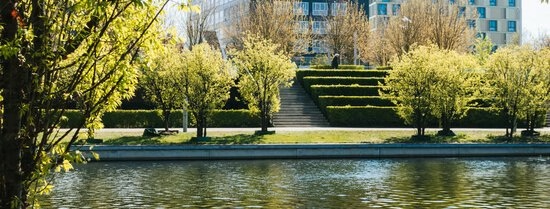Erasmus University Rotterdam has the ambition to become one of the most sustainable universities of the Netherlands. Developing a nature positive campus is an important aspect of this ambition. In recent years, the university has taken several steps towards a greener campus that is conductive of increasing biodiversity.
Green campus plan
The sustainable campus roadmap includes a "green campus" program line. This is in line with our ambition of achieving a nature positive campus. A green campus also contributes to a better and healthier work and study environment. Several steps towards a more green campus have already been taken, such as:
Mid-2021, a brainstorming session identified opportunities to enhance the nature value and biodiversity of the campus. The session also provided input on sustainable green management of the campus, which have been included in the following Park Management tender.
In Langeveld Building which opened in 2022, a lot of greenery has been planted. Moreover, nesting boxes for birds, bees and bats have been installed on and around the façade of the building.
Green roofs have been installed on several buildings on campus, including Sanders Building, Mandeville Building and Erasmus Building.
For the renovation of Tinbergen Building in 2024, trees have been sustainably replanted on campus that would otherwise have to be removed to accommodate the construction site. A bat protocol has also been drawn up to ensure that the renovation does not adversely affect the bat population in the building.
End of 2023, a nature-friendly bank was created in the pond, where animals can easily enter and exit. Furthermore, new planting (carefully selected by the campus ecologist) were placed in and around the pond in spring 2024, including a variety of different trees and plants, herbs and puddle/wetland planting.
Interview with our campus ecologist
About the plans towards a nature-inclusive campus
Increasing biodiversity on campus
Increasing biodiversity on campus is a core theme of Tomorrow's Campus III. In recent years, more colour was added to the planting to attract insects. No pesticides are used and weeds are mainly removed by weeding. Ever since EUR moved to Woudestein in 1968, Landscaping firm van der Gaag has done EUR's greenery maintenance .
An ecologist was engaged in 2023 to draw up an elaborate planting plan based on native plant species, to make the campus grounds substantially more green, more climate resilient and biodiverse.



Pond renovation
The large pond on Campus Woudestein was renovated end of 2023. Prior to the design, an ecologist studied how we could make the pond more compatible with its natural surroundings. This showed that the construction of a clay-like slope, could help promote biodiversity in the pond and the natural migration of amphibians. This nature-friendly bank has now been built and trees and plants carefully selected by the ecologist will be planted in and around the pond in the spring of 2024. Read more on MyEUR.
Campus Garden
In 2019, a garden was opened on campus, maintained by Edible EUR and the Erasmus Sustainability Hub, to inform and inspire people about the use of natural agriculture on and around campus. Compost from the composter at EUR is used as nutrient-rich soil. In addition to the vegetable garden there is also a bee palace, housing 60,000 bees. Students help the beekeeper of Bee the Change to take care of the campus bees .
